 Una cosa che ho trovato molto interessante su Linux è la possibilità di avere a disposizione tutta una serie di giochi classici già presenti nella propria distribuzione, e quindi facilmente installabili.
Una cosa che ho trovato molto interessante su Linux è la possibilità di avere a disposizione tutta una serie di giochi classici già presenti nella propria distribuzione, e quindi facilmente installabili.
Cosa intendo per classici ?
Giochi usciti prima del 2000 magari su Amiga o su altri sistemi operativi e che ora sono stati portati su Linux.
Seguitemi in questa carrellata di giochi vecchi (come concetto) ma sempre fruibili e divertenti.
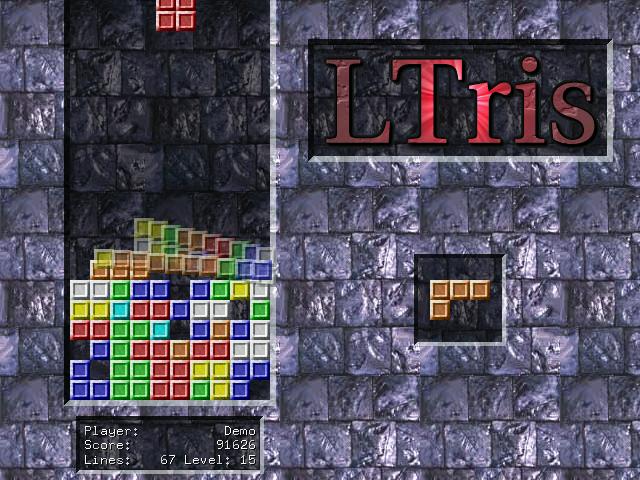
Ltris
LTris è un clone di Tetris: i blocchi di forma diversa cadono giù per il campo rettangolare di gioco e possono essere spostati lateralmente o ruotati di 90 gradi con l ‘obiettivo di costruire linee senza lacune che poi scompaiono (causando la caduta verso il basso dei blocchi sopra la linea eliminata) . LTris ha tre modalità di gioco: in Classic si gioca fino a quando la pila di blocchi raggiunge la parte superiore del campo di gioco e nuovi blocchi non possono entrare. In Figures, il campo di gioco viene riportato a una nuova figura ad ogni livello e in seguito compaiono piastrelle e linee improvvisamente. In multiplayer fino a tre giocatori (umani o CPU) sono in concorrenza l’uno con l’altro mandando le proprie linee rimosse a tutti gli avversari. E in demo potrete guardare il vostro gioco CPU gustando una tazza di tè!
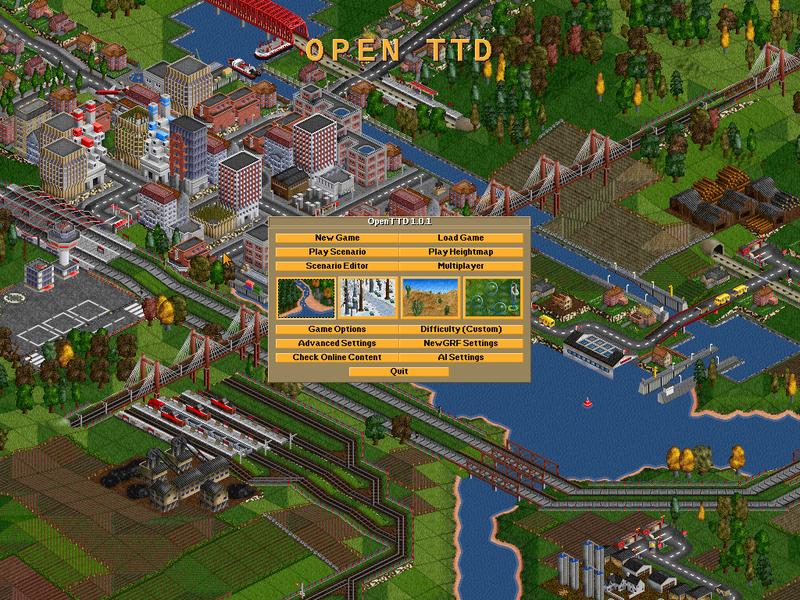
OpenTTD
OpenTTD è un gioco di simulazione open source basato sul popolare gioco Microprose “Transport Tycoon Deluxe”, scritto da Chris Sawyer. Tenta di imitare il gioco originale il più possibile ed al tempo stesso lo estende con nuove funzioni.
OpenTTD è rilasciato sotto licenza GNU General Public License 2.0.
Sono disponibili svariate lingue, incluso l’italiano. Tra le varie modifiche rispetto al gioco originale, il clone è configurabile attraverso almeno 50 impostazioni in più, che intervengono su quasi ogni variabile di gioco. È anche possibile sostituire i nomi di fantasia originali con i nomi dei veicoli reali a cui sono ispirati. È stata aggiunta anche la gestione automatica del ricambio dei mezzi e la possibilità di clonare i mezzi (faranno lo stesso percorso del mezzo originale).
Anche l’editor è più flessibile, ora è possibile creare canali artificiali in modo da poter usare meglio le navi ed è diventato più semplice fare spazi di terreno pianeggianti.OpenTTD supporta anche la modalità multiplayer LAN e Internet, sia cooperativo che competitivo, per un massimo di 255 giocatori.
OpenTTD è in fase di continuo sviluppo ed è un popolare gioco open source. Secondo uno studio dell’attività di 61.154 progetti open source su SourceForge nel periodo tra il 1999-2005, OpenTTD si è classificato 8° progetto open source più attivo nel ricevere patch e contributi
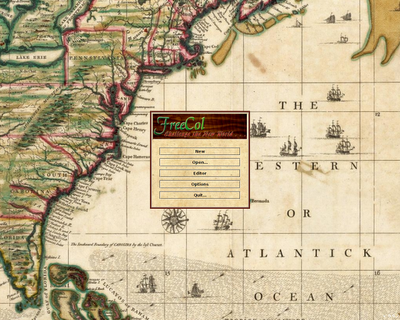 Freecol
Freecol
FreeCol è un videogioco strategico a turni sviluppato pubblicamente e rilasciato sotto licenza GNU GPL. Il gioco si ispira alla serie Colonization di Sid Meier. È stato nominato “progetto del mese” da SourceForge nel febbraio 2007[
Pur rimanendo fedele all’originale in termini di meccanica e gameplay, FreeCol ha una nuova serie grafica ridisegnata. Inoltre, con il tempo ha incorporato le idee che non ce l’hanno fatta per la versione finale del gioco di Meier, richieste dai fans e concetti originali come nuovi giocatori europei e bonus per le razze.
FreeCol inizia nell’anno 1492. Con alcuni coloni, il giocatore costruisce colonie nel Nuovo Mondo, in lotta per il potere con le altre colonie dei rivali europei. Il giocatore costruisce gradualmente queste colonie con l’aiuto del re europeo fino a quando l’aiuto da parte dell’Europa non è più necessario, nel senso che la colonia può stare da solo senza alcun aiuto esterno, e dichiara l’indipendenza dal re e, se le colonie sono in grado di resistere agli attacchi della forza reale di spedizione, la vittoria è ottenuta.
Il giocatore può commerciali con l’Europa utilizzando varie risorse naturali che vengono raccolti da città o acquistate dal commercio con gli indigeni. In ogni città il giocatore può anche costruire edifici industriali per convertire materie prime in prodotti trasformati, che vendono di più in Europa, fornendo un significativo progresso economico. Alcuni edifici industriali permettono di convertire le materie in prodotti utili per il progresso della colonia, come la conversione del legno in Martelli e dei minerali in strumenti.
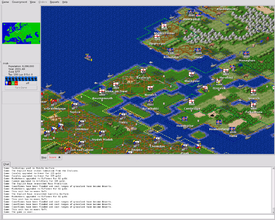
FreeCiv
Freeciv è un videogioco strategico a turni sviluppato pubblicamente e rilasciato sotto licenza GNU GPL. Il gioco si ispira alla serie Civilization di Sid Meier.
Lo scopo di questo gioco è quello di creare la civiltà più grande del mondo: ogni giocatore partecipa al gioco come leader di una grande civiltà e la porta a svilupparsi dall’anno 4000 a.C. ai giorni nostri o al futuro.
Durante il corso del gioco tutte le più importanti tecnologie sviluppate dall’uomo possono essere scoperte dagli scienziati, e tali vantaggi tecnologici permettono la costruzione di unità sempre più forti e strutture sempre più utili, per aiutare ad espandere la civiltà e a migliorare i rapporti con le civiltà nemiche.
Il gioco finisce quando una civiltà ha eliminato tutte le altre (vittoria militare) o quando riesce a costruire e a far arrivare su Alpha Centauri un’astronave. Alla fine del gioco viene calcolato un punteggio in base alla grandezza della civiltà, il numero di città possedute, di tecnologie ricercate e altri indici.
Si può giocare contro altri giocatori umani, utilizzando i metaserver oppure si può giocare contro le IA.
Freeciv è basato sul modello client/server, il server viene avviato automaticamente quando si avvia una nuova partita. Esso fornisce due diverse interfacce client: GTK2 e SDL.
Freeorion
FreeOrion è un gioco di computer libero, open source, basato a turni ed ha come tema la costruzione di un impero spaziale e la conquista galattica è progettato e costruito dal progetto FreeOrion. FreeOrion si ispira alla tradizione dei giochi Master of Orion, ma non è un clone o remake di questa serie o di qualsiasi altro gioco.
I giocatori prenderanno il timone di un neo-impero spaziale per esplorare e colonizzare le stelle. A volte è pensato come “civilation nello spazio”, il design di FreeOrion prevede inoltre un motore di combattimento tattico sulla falsariga di Homeworld e la serie Total War.
Mentre il suo design modulare e open-source permette un significativo grado di personalizzazione del motore di gioco e gli elementi di storia della comunità, la squadra FreeOrion è dedicata alla costruzione di un universo vivo, pulsante e vivo nel modello di una ‘grande campagna’.
UFO: Alien Invasion
UFO: Alien Invasion è un gioco di strategia a squadre con turni di combattimento tattico contro forze aliene ostili (umani o controllati dal computer) che sono si sono infilitrate sulla terra in questo momento. Siete al comando di una piccola unità speciale che è stata fondata per affrontare la forza aliene attaccanti. Per avere successo nel lungo periodo, è necessario la ricerca della tecnologia aliena, al fine di costruire armi più grandi e migliori contro i vostri nemici.
‘UFO: Alien Invasion’ è fortemente ispirato alla serie ‘X-COM’ di Mythos e Microprose. Il primo gioco della serie, ‘UFO Defense ‘, diventato un classico ed uno dei migliori giochi mai realizzati.
Come il gioco originale di X-COM, UFO: AI ha due modalità principali di gioco: la modalità Geoscape e modalità Tactical. In modalità Geoscape, il gioco è sulla gestione e la strategia. In modalità Tactical, il gioco consiste nel prendere il comando della vostra squadra in diverse missioni per combattere gli alieni ovunque essi possano apparire.
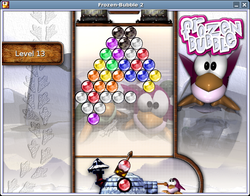
Frozen Bubble
Frozen Bubble è una versione free di Puzzle Bobble disponibile per molti sistemi operativi inclusi Linux, Mac OS X e Windows. Esiste anche una versione applet per singolo giocatore scritta in Java.
L’originale Frozen Bubble fu scritto in Perl da Guillaume Cottenceau, e usa le librerie Simple DirectMedia Layer (SDL). Il gioco presenta 100 livelli e include un editor di livelli. Come la maggior parte di giochi open source, presenta dei pinguini simili a Tux, che in questo gioco sparano bolle ghiacciate per formare gruppi dello stesso colore. I gruppi formati vanno mano a mano scomparendo fino a quando il giocatore non le rimuove tutte dallo schermo.
La versione 2.0 del gioco, disponibile esclusivamente per Linux, permette di giocare in modalità multiplayer online o tramite LAN.
Conclusione
Spero di avervi fatto ricordare qualche bel vecchio gioco classico e di avervi fatto venire voglia di provare (o rigiocare) ad uno di questi bellissimi giochi..e se ne conoscete altri, lasciate un commento.
Popular Posts:
- None Found

I would suggest also the strategy game Wesnoth.
What is it about Frozen Bubble that it appears on every “Best Linux Games” list? This is really one of the best that we have to offer?
I luvs frozen bubble 😉
While Wesnoth does not fit your criteria for inclusion on this list (it was released in 2003) but I do have to second the notion that Wesnoth is one game that should make most of these “lists”
What about these?
Port of Star Control 2 (now named Ur-Quan Masters): http://sc2.sourceforge.net/
Privateer Remake
I’m also quite fond of Crimson Fields, a classic turn-based war game, and of Hex-a-Hop, and clever puzzle game with a multitude of levels.